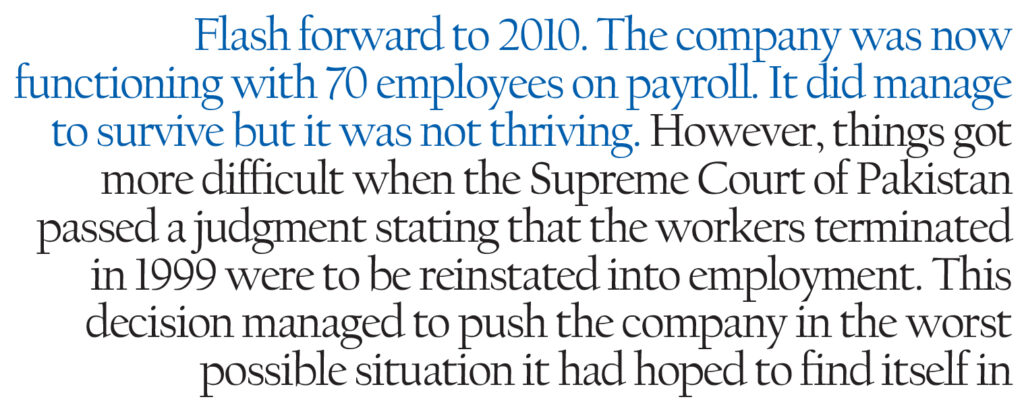This one is straight out of a Hollywood blockbuster. We say that because it has everything. Powerful men with powerful connections that have stakes in the company. Workers unionizing, rising in revolt, and storming their place of work to seize control. Possible arson and a global pandemic. Take any one of these aspects and you will be able to tell a gripping story. The company’s entire history, all the way from its establishment in the early 1960s to its production facility bursting into flames in 2018 does not have a single dull moment in the middle, and a recent auditor’s report for what happened at their production facility in 2019 has shed more life on the company’s colourful history. So let us get started, shall we?
Colonial beginnings
The story starts in the early 1950s, at a time when plastic had still not taken over the world and packaging was dominated by tin cans and caps. Before partition, there were only two tin container manufacturing units in the subcontinent owned by a giant company, Metal Box of the United Kingdom. These factories were located in Bombay and Calcutta, which catered to the demand of undivided India. While they were important for commercial products as well by the turn of the 20th century, their main role was providing packaging for food used in the colonial army.
After partition in 1947, however, the Pakistan army did not have a facility making tin packaging for their food. For the first few years, Metal Box exported these items to Pakistan and the army used a few skeleton facilities which flattened and repurposed old cans. Given the severity of the situation, Metal Box decided to set up a facility in Pakistan as well. In 1953, with the collaboration of local sponsors, a production facility was established in Karachi for tin containers and cans under the name Hashimi Can Company. From its very inception, Hashimi was the largest tin manufacturer in Pakistan and had the business of the Pakistan Army, which meant it grew very quickly.
At the start, the company was managed by the British directly, and expanded its activities by opening branches in Chittagong, Lahore and Peshawar. In late 1966, the management changed hands and Pakistani management took over and the company was listed on the Karachi Stock Exchange (now PSX). This new management would stay until the 1980s, and it would be under them that the seeds for the eventual chaos of this century would be sown. And the man at the helm would be Gaohar Ayub, the enigmatic son of former President Ayub Khan, son-in-law of General Habibullah Khan, and former Speaker of the National Assembly of Pakistan, who would remain the Chief Executive Officer (CEO) of the Hashimi Can Company from 1968-1980. It would be under his watch that labour issues would arise, and that management would change hands once again.
Enter the Field Marshal’s son
Here is what we know up until now. At the time of partition, Pakistan had no tin can manufacturer so a British company set-up a facility in Karachi. In 1966, British management was forced out and Pakistani management took over, and Gohar Ayub took over as CEO. Here is all you need to know about Gohar Ayub – up until 1969, he was the most entitled man in Pakistan, and used his position as the son of the President to accumulate massive amounts of wealth.
Initially, Gohar had hoped to follow his father into the military and was at different points treated by Ayub as a possible successor, acting as his father’s aide de camp on trips to Europe and helping run his father’s controversial 1965 presidential campaign against Mohtarma Fatima Jinnah. His career in the army, however, would not see the heights of his father. While his father would award himself the highest military rank possible (Field Marshal) Gohar Ayub would never be promoted beyond Captain. Allegations of disciplinary and professional misconduct followed his career, and he was eventually given premature retirement by the army’s promotions branch.

With an early end to his career in the military forced upon him, Gohar Ayub would enter the world of business. You see, he was originally expected to follow his father in doing well in the army, and had early on in his career been married off to the daughter of General Habibullah Khan, the founder of Ghandhara Industries. So when he was made to retire in 1962, his father-in-law set him up with Universal Insurance Co., and he would also work as a Managing Director in Ghandhara Industries from 1963-1968. Since Hashimi Cans already had such a great relationship with the army, in which Gohar Ayub had countless connections, once his stint at MD would end, he took over as CEO of Hashimi Cans, where he would stay for the next 12 years.
It would be in this era that Hashimi Cans began to face serious labour issues. The company had more employees than it could manage, and at this point, plastic was starting to become more popular than tin for caps and packaging. Eventually, in 1980, new management had to be brought in again after the company’s plant in Karachi was shut down because of the ongoing tussle between management and the labour force.
To run the show, Munawar A Malik was brought in as Managing Director. Malik managed to revive the fortunes of the company. On the company’s website, he is referred to as being famous as a ‘doctor of sick industries.’ Since then the company is being run with professional skills. Subsequently few more can making units started operating. The present can making capacity in Pakistan is more than the current demand for containers, but Hashimi can company is concentrating on specialty tin containers and exports.He brought the company back to life and had managed to help Hashimi Can to the extent that it won the 25 companies award in 1996 and in 1997. But the baggage of the company’s past and its issues would continue to haunt Munawar.
Things start going bad
Things however took a turn for the worse again when the company could not keep up with the changes in market dynamics. The world had moved on to plastic as opposed to tin. Despite Malik’s suggestions, the company continued with tin packaging and managed to lose out on its precious market share. As a result, it became less profitable and eventually had to let go of 389 permanent workers out of a total of 600.
The employees however did not feel that lack of business remains a strong enough reason to terminate their jobs and therefore filed grievance applications in court. Hashimi Can faced its fair share of litigation and lawsuits. During all this, the sponsors decided to exit and offered Malik the chance to buy out their stake to which he accepted.
Flash forward to 2010. The company was now functioning with 70 employees on payroll. It did manage to survive but it was not thriving. However, things got more difficult when the Supreme Court of Pakistan passed a judgment stating that the workers terminated in 1999 were to be reinstated into employment.
This decision managed to push the company in the worst possible situation it had hoped to find itself in. As per the management, not only was the cost of additional 389 employees a financial burden then found hard to bear, but the company remained wary of them as they still deemed them as the “miscreants who were behind the shutdown of the company in the 1980s.”
Following reinstatement, the workers demanded at least one million rupees as compensation for eleven years. This, however, was not asked for by the Supreme Court in their judgment and therefore the company denied falling to their whims.
This prompted the employees to unionize once again and strike without notice on November 3, 2020. They also organized a sit in. This time, the employees managed to get a stay order from NIRC against termination whilst protesting indefinitely.
Once again, the company found itself with the difficult decision of shutting down under Standing Order 11(1) of Industrial and Commercial Employment Ordinance 1968. Through this ordinance, they had terminated the services of all employees on January 18, 2011.
The story doesn’t end here. Instead of going home and accepting their termination upon the closure of the company, the employees returned and “stormed the factory” and “took illegal possession of the premises”. All the while, the company records were destroyed in addition to damages made to the installation, plant and machinery.
Did things get better?
Hashimi Can Company is not a company known for its luck. In 2018, the company premises caught fire resulting in the building being weak enough to collapse. For a company that was already struggling, investment seemed out of the question and therefore the management decided to sell the plot of land and settle all their liabilities.
In the meanwhile, as per the company management, the terminated employees did not quit their antics against the company. The employees threatened real estate agents and said that they would not let new occupants operate their business on that land. Despite that, the sale was executed in May 2018.
Flash forward to the present, the company still exists. However, over the decade three senior directors passed away. It was extremely difficult for the company to induct directors considering its unfortunately tricky history, its outstanding liabilities, and legal matters.
With the remnants of the proceeds of the land, the management decided to go into the business of food can caps which are easy open ends. They are often imported and this will help serve the local industry. In addition, the business also mulled the decision to go into the business of trading specialty tin cans and closures.
Luck, however, came in the way again and when things seemed better for Hashimi Can, the global pandemic hit.
As of now the company is a defaulter on the PSX. The sponsor however has managed to take back control of the company. It now has to answer to the PSX and SECP for the delays in filing, holding AGMs and other formalities the company was unable to do keeping in mind the destruction of records and the illegal occupation of the premises by the workers. The company now requests the PSX to help it get out of trouble and become an active member.









